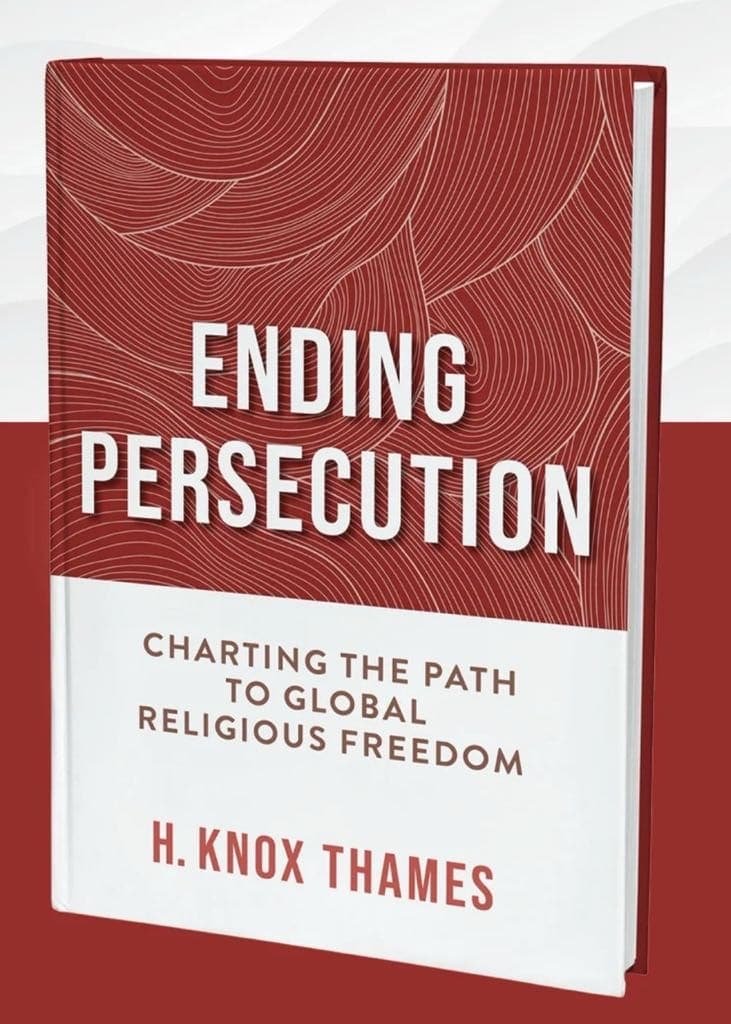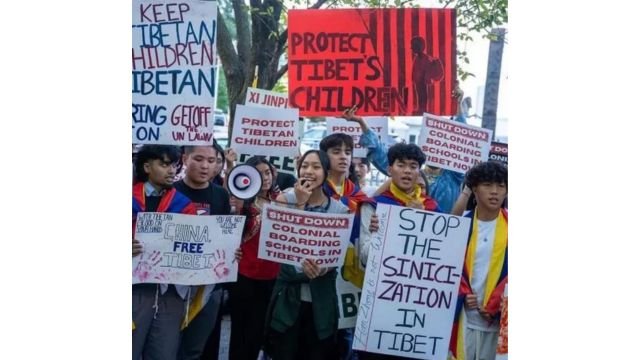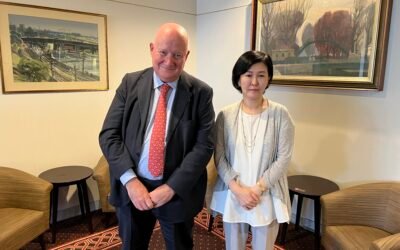In a powerful new book, the American scholar and former diplomat offers innovative solutions for the global freedom of religion crisis.
by Massimo Introvigne

University of Notre Dame Press has just published what may well be one of the most important books on freedom of religion or belief in recent years, with the title “Ending Persecution: Charting the Path to Global Religious Freedom.” The author, Knox Thames, is a lawyer specialized in international religious liberty issues. He has served inter alia the Obama and Trump administrations as the Special Advisor for Religious Minorities in the Near East and South/Central Asia at the State Department. “Bitter Winter” has interviewed him on some of the key issues and proposals he discusses in his new book.
Q.: How did you go from your diplomatic work to writing a book for a major academic press?
A.: For twenty years, I worked in different U.S. government capacities, lastly at the Department of State, appointed by the Obama administration as a special envoy for protecting the rights of religious minorities in the Near East and South/Central Asia. After the election of President Trump, his administration asked me to stay. In Summer 2020, I received a Templeton Religion Trust grant to write this book, which is not intended solely for an academic audience only but also for general readers. I am also a senior fellow at Pepperdine University and a senior visiting expert at the U.S. Institute of Peace.
Q.: In the book you use a strong expression, arguing that we may be out of the COVID-19 pandemic, but a not less dangerous pandemic of global religious persecution continues…
A.: Indeed. Every faith community is persecuted somewhere in the world. Very often their brothers and sisters in the faith who live in the West do not appreciate or do not even know that their co-religionists are persecuted for the simplest things, such as praying or sharing their faith. It is a pandemic of persecution with millions suffering for their beliefs. The book’s aim is to inspire the United States and other countries to be true to their values and do something about this pandemic. I argue that this is also in our interest, as persecution leads to instability, violence, and uncontrolled migration. And I propose some new pathways to go upstream of the problems.
Q.: Living in Europe, I regard the international efforts of the U.S. to advocate for religious liberty globally as a model to be imitated by European countries. Yet, by reading your book, I saw that you find room for improvement in the U.S. too…
A.: As a former American diplomat, I am proud of how our country has devoted unparalleled resources to the cause of international religious freedom. However, being really good is not good enough, as religious persecution continues. One important point is international cooperation with other rights-respecting countries. I am encouraged by the fact that likeminded countries have created specific diplomatic positions like the U.S. Ambassador-at-Large for International Religious Freedom. While other countries will not have the resources of the United States, there is a strength in alliances. Asia Bibi is a case in point. I worked with ten different countries after she had been acquitted but could not leave Pakistan to persuade the Pakistani authorities to let her go to Canada. In the end, we succeeded. Speaking with a unified voice for religious freedom is powerful. It is not hyperbole to say that for the first time in human history, different nations are working together to advance religious freedom for people in different countries of different faiths. It is incredibly positive and hopeful.

Q.: Yet, some countries such as Hungary have created positions whose mandate is protecting the “religious freedom of Christians” rather than the religious freedom of all faiths…
A.: I am critical of the Hungarian approach singling out persecuted Christians only. I am a Christian and I want to see Christians protected, but the best way of securing freedom for Christians is making sure that everybody has freedom of religion or belief. Singling out Christians may have short term advantages but has long term negative consequences. This is not to say that advocating for your own brothers and sisters is wrong. This is not true. But to achieve results we need a broader perspective.
Q.: One of the reforms you advocate in the book concerns USCIRF, the U.S. Commission for International Religious Freedom. You have worked there yourself. Now you suggest renaming it the American Council on International Religious Freedom (A-CIRF) to clarify it has a different role from the U.S. Department of State. You also suggest restructuring it so that it can be active in giving grants working for religious liberty—being less cautious than other U.S. institutions in selecting who will receive these grants—rather than producing reports that sometimes duplicate those of the Department of State. One problem I see with this proposal is that USCIRF sometimes produces timely ad hoc reports, a few weeks after a new religious liberty crisis has manifested itself somewhere in the world, while for the Department of State we should wait for the next yearly report, meaning the reaction can come only after several months.
A.: I have worked both at the USCIRF and at the Department of State and I know both. I have great respect for the USCIRF. Part of my proposal is to resolve the confusion on who is speaking officially for the government of the United States. I have also proposed that USCIRF change to a .org rather than a .gov website. It could still speak in a timely fashion on urgent issues. But it could also expand its activities to become a grant-giving institution.
Giving grants means taking risks. Other U.S. institutions do give grants to entities working for religious freedom abroad, but they tend to minimize the risks. Their main concern is to avoid being accused of wasting the money of American taxpayers. Now, in this field to be effective you should take some risks and accept that in some cases the grants will not fully achieve the results you hoped for. The USCIRF, or the new A-CIRF, when properly funded will be in a uniquely favorable position to give such grants. It can take a more entrepreneurial approach, acknowledging that among several investments some will give good results, and some will not. The grants should be comparatively small to minimize risks for the taxpayers. But they should be given quickly, and Congress should accept a reasonable margin of error.

Q.: “Bitter Winter” was born as a magazine about religious persecution in China and advocates, as your book also does, for an uncompromising attitude in denouncing the religious freedom violations there. However, there are those who object that these denounces have costs in terms of damaging business with China and do not have benefits, since China has not changed its attitude to religious liberty, which if anything is becoming more repressive.
A.: China is discussed at length in my book. I am both critical of the U.S. diplomatic response, as I believe that more can be done, but I am encouraged it is going in the right direction, as religious persecution has been clearly and publicly denounced. China is forcing all of us to answer the question, “how much do we value our values?” Are we willing to sacrifice some of our business with the second (or first) economy in the world for the sake of human rights? Giving only lip service to human rights does not work. If we say human rights matter, then they must truly matter in all our engagements.
We need others to stand up too. While at the State Department, I visited the headquarters of the Organization of Islamic Cooperation in Jeddah, Saudi Arabia. They were prepared to denounce the persecution of the Rohingya but not the one of the Uyghurs, because I believe of Chinese intimidation. This is also true in some European countries, especially those who joined the Belt and Road Initiative. We should work together to pressure China to change course. But even if they do not, such efforts can positively influence others through deterrence. Many countries are looking at how we respond to China. We can convince some would-be persecutors in other countries not to imitate China only if we react in a firm, consistent, and persuasive way to China’s violations of religious freedom. Otherwise, we lose credibility, not with China only but with everybody else too.

Q.: “Bitter Winter” advocates for the rights of non-traditional religious minorities as well. You mention the cases of the Jehovah’s Witnesses, which are persecuted in several countries, including some with democratic governments, and of the Ahmadiyya community, which is in trouble in a good part of the Islamic world.
A.: I believe that one serious problem is the existence, including in democratic countries, of the registration systems. Sometimes they ask for a certain number of believers as a pre-condition for registration, making it impossible, like in Slovakia, for smaller religions to be recognized as faith communities. Hungary’s law requires an act of parliament for registering any new group, thus politicizing the issue. I often point out that these countries would have prevented the twelve disciples of Jesus from being registered in their country. While discriminatory in Europe, elsewhere registration can lead to jail when countries make unregistered activity illegal, as we see in the former Soviet Union. There, the Jehovah’s Witnesses are often a main target. So are the Ahmadis in many Muslim countries. Certainly, there should be criteria to avoid using religion to defraud the state for tax purposes. But short of these clearly fraudulent cases, small, new, or unpopular minorities should not be discriminated against.
Q.: Are there more signals of hope or of concern in the present global situation of religious liberty?
A.: The challenge is immense. Millions and millions live in countries with very narrow lanes of religiously permitted activities. There are different types of persecution. It is not monolithic and there is not a one-size-fits-all solution. I am, however, encouraged by new efforts reaching across religious, political, and geographical differences to advocate for all. While we have theological or political disagreements, we agree on religious freedom for all, and this is good news. But to end persecution in the 21st century, we should develop new 21st century tools to advocate for religious freedom globally. Hopefully, my book will spark new ideas and a stronger commitment.

Massimo Introvigne (born June 14, 1955 in Rome) is an Italian sociologist of religions. He is the founder and managing director of the Center for Studies on New Religions (CESNUR), an international network of scholars who study new religious movements. Introvigne is the author of some 70 books and more than 100 articles in the field of sociology of religion. He was the main author of the Enciclopedia delle religioni in Italia (Encyclopedia of Religions in Italy). He is a member of the editorial board for the Interdisciplinary Journal of Research on Religion and of the executive board of University of California Press’ Nova Religio. From January 5 to December 31, 2011, he has served as the “Representative on combating racism, xenophobia and discrimination, with a special focus on discrimination against Christians and members of other religions” of the Organization for Security and Co-operation in Europe (OSCE). From 2012 to 2015 he served as chairperson of the Observatory of Religious Liberty, instituted by the Italian Ministry of Foreign Affairs in order to monitor problems of religious liberty on a worldwide scale.



